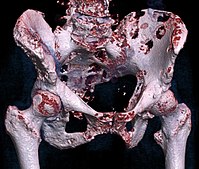
Photo from wikipedia
Both cancer and therapies used in the treatment of cancer can have significant deleterious effects on the skeleton, increasing the risks for both bone loss and fracture development. While advancements… Click to show full abstract
Both cancer and therapies used in the treatment of cancer can have significant deleterious effects on the skeleton, increasing the risks for both bone loss and fracture development. While advancements in cancer therapies have resulted in enhanced cancer survivorship for patients with many types of malignancies, it is increasingly recognized that efforts to reduce bone loss and limit fractures must be considered for nearly all patients undergoing cancer therapy in order to diminish the anticipated future skeletal consequences. To date, most studies examining the impact of cancer therapies on skeletal outcomes have focused on endocrine-associated cancers of the breast and prostate, with more recent advances in our understanding of bone loss and fracture risk in other malignancies. Pharmacologic efforts to limit the adverse effects of cancer therapies on bone have nearly universally employed anti-resorptive approaches, although studies have frequently relied on surrogate outcomes such as changes in bone mineral density or bone turnover markers, rather than on fractures or other skeletal-related events, as primary study endpoints. Compounding current deficiencies for the provision of optimal care is the recognition that despite clearly written and straightforward society-based guidelines, vulnerable eligible patients are very often neither identified nor provided with appropriate treatments to limit the skeletal impact of their cancer therapies.
Journal Title: British journal of clinical pharmacology
Year Published: 2019
Link to full text (if available)
Share on Social Media: Sign Up to like & get
recommendations!